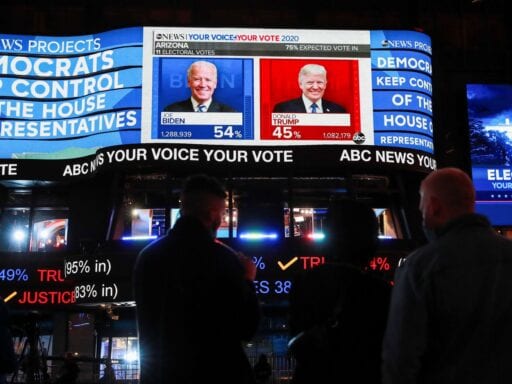Betting markets aren’t great at predicting election outcomes, but thousands have put big money on the presidential race.
The slow tally of election results has been excruciating for many Americans. We’re trapped in an uncertain limbo, refreshing electoral maps and wondering why vote counting is taking so long. I wouldn’t wish this anxiety on anyone who doesn’t have a personal stake in US electoral politics, but thousands of non-Americans have eagerly placed bets on the presidential race.
There’s a thriving market for gamblers in Europe and Asia, and the still-too-close-to-call nature of this year’s race means that bookies are still able to take bets. In fact, the 2020 presidential election is drawing a record amount, primarily from the United Kingdom. One British participant has put down about $1 million on a victory for Joe Biden. Betfair Exchange, the country’s largest betting site, has taken in around $634 million (£490 million) worth of wagers thus far, according to Pete Watt, public relations manager of the odds comparison site Oddschecker. By comparison, $257 million (£199 million) was placed on the 2016 race.
Under most circumstances, Americans are not legally able to wager money on US election results. Certain qualified US residents can choose to bet on the Iowa Electronic Market or the site PredictIt, which are legally allowed to operate for research and teaching purposes.
However, the US has a long history of illicit betting markets. According to a 2003 paper on the history of electoral betting, there was a “large, active, and highly public market for betting on presidential elections” before World War II, located in major cities like New York, Philadelphia, Chicago, and Baltimore.
Biden, whom Oddschecker has projected as the winner since May, was the favored candidate going into election night as far as betting was concerned. The New York Times reported that for a bettor to win $1, they needed to put down $2, which meant Biden was considered to have a roughly 66 percent chance of winning. Yet the odds for a Biden victory on the betting market were much lower than what pollsters had predicted.
Prediction markets are not always accurate; they can often be flat-out wrong. “Existing prediction markets are too small in scale, hard to interact with, and hard to make money from, which renders them inaccurate and vulnerable to manipulation,” wrote Vox’s Kelsey Piper in February on the odds of the Democratic primary. Betting markets in February erroneously projected Mike Bloomberg as the Democratic nominee and hyped up Andrew Yang’s long-shot campaign. The odds of a candidate can possibly be skewed, Piper reported, if someone with a lot of money is betting on them.
The early results on November 3, however, suggested that the betting market turned out to be quite prescient. Sportsbooks assumed that the 2020 election would be a much tighter race than what pollsters and forecasting models had anticipated, Watt explained to me over email: “The odds suggested a 65%-35% probability in Biden’s favor.”
“It was once those early projections began to come in from Florida [showing Trump leading] that we saw a huge swing in the betting, with bettors rushing back to the President to pull off another electoral upset,” Watt added. “His odds-implied probability of a second term soared from 36 percent at 9 p.m. Eastern Time up to 69 percent just after midnight.” At that time, 93 percent of bets being placed were in Trump’s favor.
“There was one stage in the night where the odds were changing every single time I refreshed my browser every thirty seconds or so,” Watt said. “It was extraordinary.”
When Biden began to perform more favorably in states like Georgia and Arizona, bettors began to lean toward him again, and the Democratic candidate has held on to his lead as the frontrunner since. Trump’s chances of winning reelection are now very slim, according to oddsmakers, with Oddschecker reporting that he currently has about a 13.3 percent chance of victory.
But until all the votes are counted, no one can be sure if pollsters or betting markets are accurate in their predictions. It’s a million-dollar question nobody knows the answer to yet.
Author: Terry Nguyen
Read More



